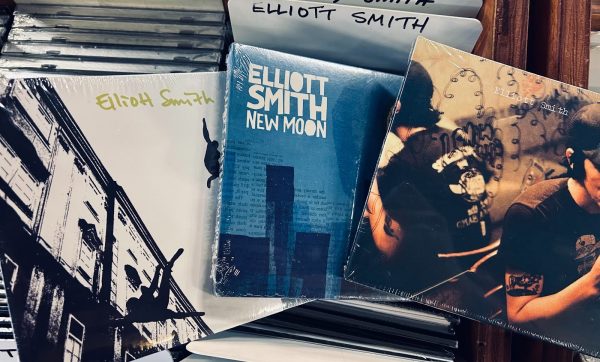
Influential artists and bands come from around the world, through all different genres of music. Portland has also been a source of discovered talent; some examples include The Shins, The Decemberists, and Esperanza Spalding. Another prominent example is Elliott Smith, who has left a lasting impact on Portland through his music, which often reflected the atmosphere and scenery of the city. Smith lived in Portland for most of his life, and wandered around a lot of the Portland area, performing his music and making a name for himself. Different artists and bands cover his music; one of these includes the Rose Parade Band. Lead singer Shiloh Schatzkamer says the band was created in September of 2021 by Aber Miller. Miller, the pianist, explains that he had the idea to start an Elliott Smith cover band around 10 years before he went through with it. Schatzkamer joined the band through an ad she saw when she was scrolling on Craigslist. She had wanted to get back into music and comments that she was extremely lucky to have found the ad.
Both Schatzkamer and Miller are very enthusiastic fans of Elliott Smith. They describe Smith’s music as tragic, real, and powerful, with a unique style of playing guitar and distinctive vocals. Miller’s favorite song to perform is “Junk Bond Trader” and Schatzkamer’s is “Ballad of Big Nothing.” Schatzkamer claims it’s her favorite “because it’s a good song first of all, and it just happens to be really suited to my vocal range.” Schatzkamer continues, “It also has a lot of passion in its delivery.” Smith’s lyrics, along with his tone, create a sense of connection with his audience. Miller explains, “[Smith] is very harmonically dense,” meaning he uses an immense amount of chords which add complexity to the music, evoking different emotions. Miller adds that Smith “likes elaborate harmony,” and that it “seems like he’s trying to find sets of chords that have never been used before.” Along with this, Miller states that Smith is trying to “push the boundaries and explore harmony. That’s what makes him, to me, such a distinct songwriter.”
Schatzkamer says that what sets Smith apart from other songwriters is his lyrics; she says Smith’s lyrics “use so much imagery that feels familiar, and a lot of his lyrics are just his inner voice and thoughts which are very thoughtful and compelling and depressing and also very optimistic and romantic.” Smith was not afraid to be authentic with his songs, Miller states, adding, “Unlike other artists when they make sad songs, Smith’s songs have no counterbalance, they are real and honest.”
Miller says the Rose Parade Band was created because “we do have a responsibility to honor him and respect his music and treat it right.” Schatzkamer adds that she also thinks “it’s kind of special that we’re in Portland doing it locally. I feel like there was emptiness here when it comes to playing his music live locally, so I think that’s cool we’re doing it in Portland to honor the place where he is maybe most well known.” Elliott Smith means a lot to both Miller and Schatzkamer, whether it be because they respect his talent or because of what he represents. They try their best to honor him with their covers, and to capture Smith’s vibe by knowing the essence of his music and taking his work to heart.
The Rose Parade Band has gotten to meet many people who knew Smith when he was alive. Miller says, “Getting to at least talk to those people who either knew him, or at least saw him perform these sorts of things live is real for us, and it kind of makes us feel we’re a little bit in his universe.” Both Miller and Schatzkamer believe that Smith is growing in popularity because, as Miller says, “we’re living in a bleak, tough time right now, and the music of hard times is going to speak to us, and I don’t think anyone wrote it better than Elliott.” Smith’s music holds up with many to this day, and as Miller adds, “We really need to keep the great, great music alive. And with the sheer number of music to listen to now, it’s very easy for stuff to get lost in that. I think we really need to do whatever we can to share it and make sure people hear it.” Miller also praises Smith and his upstanding nature, saying, “I feel like there’s this other side of him we really also need to remember as well, which is what a really good, solid person he was.”
Smith also continues to influence younger generations. Clyde Finkel, a junior at Franklin, is a fan of Elliott Smith. Finkel has been listening to Smith for years, but started listening extensively four years ago. Finkel owns all of Smith’s albums on vinyl, and Smith has been his “top artist for the last three years.” He was introduced to Smith’s music by his father, who is also a fan. Finkel says that Smith’s lyrics “didn’t feel like he put a mask on for them. He said things as they were.” Finkel continues,“His lyrics took place in real places and were about real people in Portland, giving people something to relate to.”
Finkel also covers Smith’s music, saying his guitar technique “is super different that any other artist has ever done.” Finkel claims that Smith’s music is similar to many other artists, such as Fiona Apple, Big Thief, and Adrianne Lenker. He believes Smith revolutionized music, influencing artists to become significantly more personal with their lyrics, and inspired a much more complex way of playing the guitar.
Finkel feels Smith “made music because he liked making music, and he had this feeling of not caring what people thought.” Finkel tries his “best to carry on his legacy and make sure people don’t forget about him” by using and learning Smith’s unique way of playing the guitar. Finkel says that when Smith passed away, the world lost “a good figure, a person people could look up to, a very outspoken person, and a friend.” He adds, “Smith was timeless with his music, resonating with the struggles teens go through.”
Elliott Smith means a lot to listeners, and other artists as well, many claiming him as an inspiration and feeling his absence after his passing. Miller states, “I think it took a lot of hardship to make these amazing songs. You don’t think you can make art that powerful if you’re living a comfortable life.” Comments from people who knew Smith and from people he inspired remind us that Elliott Smith was a person, not just a tragedy. He had a passion for music that shared his life stories, ultimately shaping his legacy.



































